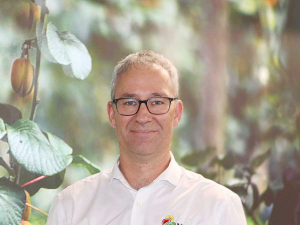Storm damage unlikely to dampen strong kiwifruit season, says growers’ body
While the recent storms in the upper and eastern part of the North Island have hit a few kiwifruit growers, it is unlikely to have a major impact on the overall industry.
 Colin Bond, NZKGI says climate change is providing on-going challenges for kiwifruit growers through the world.
Colin Bond, NZKGI says climate change is providing on-going challenges for kiwifruit growers through the world.
Climate change and its effects was the number one item on the agenda of the annual International Kiwifruit conference held this year in Greece.
Colin Bond, chief executive of NZ Kiwifruit Growers organisation (NZKGI), told Rural News that climate change is providing ongoing challenges for kiwifruit growers through the world.
He says, for example, the US had its hottest July since 2000, that in Greece the temperature in summer was two degrees hotter than normal and there were a range of extreme events including floods in Europe.
"These events, including those in NZ, are making life in horticulture extremely difficult. For example, in Chile they talk quite openly that their kiwifruit growing regions are progressively moving south," he says.
Bond says in NZ's case, Cyclone Gabrielle was the biggest event and we are in a similar position to other countries; NZ has a broad range of growing regions and so, if needed, there will be options to grow in other cooler regions. It is also known that research is being done to breed new varieties of kiwifruit which are less affected by warmer temperatures.
But like many other primary sectors in NZ, the trend towarsds warmer temperatures means that new risks will emerge from pests and disease.
Bond says cold winters are important to kill pests that can't survive the cold.
"The big thing that did come out of the conference is that NZ is still recognised as a global leader in the kiwifruit sector. The Zespri model is doing a huge amount for the category overall globally and we are looked to as the expats in growing and the experts around biosecurity as well," he says.
Good Days Return for Growers
Besides going to the international conference in Greece, where he also looked at plantings of kiwifruit, Colin Bond spent time at ports in Spain and Belgium to see the state of NZ kiwifruit arriving in European markets.
He says the quality of the fruit he saw at the market was excellent.
He says with the NZ kiwifruit harvest over, it's now up to Zespri to sell the remaining fruit while growers are busy preparing for next season. He says the 2024 harvest was one of our best despite problems in isolated areas.
"So, after a couple of challenging years we have had a very good season and importantly we have had a long period of chill this winter, so we are hopeful that 2025 will be equally successful, but plenty of water still has to go under the bridge," he says.
Bond says average returns for this year have been very good, in contrast to last year when many growers suffered from a late frost, which meant volumes were down. What he's hearing from growers is that in 2024 their volumes are getting back to normal. Certainly, Zespri is indicating strong prices in market.
"So whilst it may not be a record season for growers, they will certainly be in the top quartile and that will be welcome relief after a couple of tough years," he says.
Success cannot be taken for granted, says Bond, and he notes that what has been achieved is due to a huge amount of excellent work by people right along the supply chain. He says while some growers are still recovering from the bad times, overall the industry has a lot of positives to reflect on - especially the very strong demand in market for kiwifruit.
And just a reminder than next week in the Bay of Plenty, the kiwifruit sector will be celebrating this success and some of the historic milestones in its evolution.
Agrisea NZ has appointed Craig Hudson as it's new chief growth officer.
State farmer Landcorp, trading as Pamu, is a forecasting a full-year net profit of around $100 million.
Tony Aitken, chief executive of Ruralco, has been awarded the Excellence in Business Leadership Award at the ANZ Business of the Year Awards.
Global trade has been thrown into another bout of uncertainty following the overnight ruling by US Supreme Court, striking down President Donald Trump's decision to impose additional tariffs on trading partners.
Controls on the movement of fruit and vegetables in the Auckland suburb of Mt Roskill have been lifted.
Fonterra farmer shareholders and unit holders are in line for another payment in April.

OPINION: Here w go: the election date is set for November 7 and the politicians are out of the gate…
OPINION: ECan data was released a few days ago showing Canterbury farmers have made “giant strides on environmental performance”.